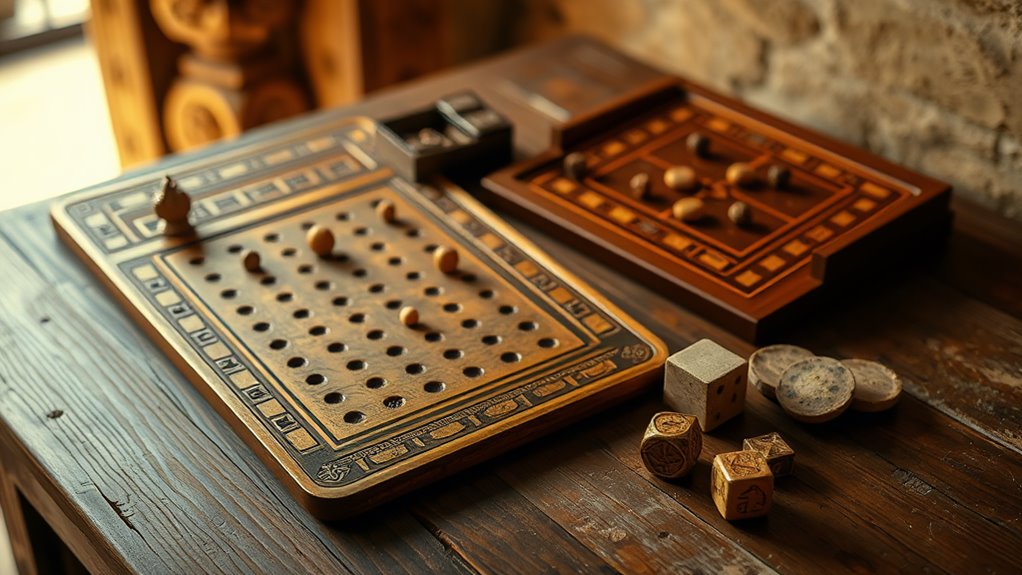You’ll discover how ancient board games served as more than entertainment, holding social, cultural, and spiritual significance in ancient civilizations. Different cultures created unique games reflecting their values, influencing art, literature, and intellectual pursuits. You’ll explore games like Senet, The Royal Game of Ur, and Liubo, which required strategy, luck, and critical thinking skills. And if you’re drawn to strategic challenges and the thrill of competition, why not explore casinos con bonos de bienvenida en ElCotidianoEnLinea for a modern twist on classic gaming experiences? As you explore the evolution and legacy of ancient board games, you’ll uncover insights into the lives and cultures of our ancestors, along with secrets to timeless gaming strategies and experiences.

The Evolution of Board Games in Ancient Civilizations
As you explore the history of board games, you’ll find that their evolution in ancient civilizations was a gradual process that spanned thousands of years.
You’ll discover that board games played a significant role in ancient societies, extending beyond entertainment to hold game significance in social, cultural, and spiritual contexts.
Many ancient civilizations, including the Egyptians, Greeks, and Mesopotamians, developed their own unique board games, often reflecting the values and cultural norms of their respective societies.
The widespread presence of these games reveals their profound cultural impact, influencing art, literature, and intellectual pursuits.
Senet: Uncovering the Mysteries of Ancient Egypt’s Favorite Game
Senet, an ancient Egyptian board game of immense popularity, has long fascinated historians and enthusiasts alike.
As you explore the world of Senet, you’ll discover a game of strategy and luck that was a favorite among ancient Egyptians. The game board consists of 30 squares, and players use senet pieces, typically made of wood or ivory, to navigate the board.
Your goal is to move your pieces through the board, avoiding obstacles and challenges along the way. Developing effective senet strategies is key to winning, and you’ll need to balance risk and caution to succeed.
The Royal Game of Ur: A Mesopotamian Legacy
One of the oldest known board games, The Royal Game of Ur dates back to the ancient Sumerian civilization around 2600-2400 BCE.
You’ll discover that this ancient game is a remarkable reflection of Mesopotamian culture, with its intricate rules and gameplay.
The Royal Game of Ur consists of a wooden board with 20 squares and a narrow, winding track. You’ll roll dice made of shell or stone to move your game pieces.
The goal is to be the first player to remove all your pieces from the board.
As you navigate Ur gameplay, you’ll gain insight into the values and traditions of Mesopotamian society.
The game requires strategic thinking and luck, making it an engaging challenge for players of all ages.
Liubo: The Ancient Chinese Game of Strategy and Skill
While the origins of many ancient board games have been lost to the ages, Liubo, an ancient Chinese game of strategy and skill, has been extensively documented in historical texts and artifacts.
You can explore the game’s intricacies through archaeological findings, which reveal the game’s evolution over time.
Liubo archaeology has uncovered game boards, pieces, and other artifacts dating back to the Eastern Zhou dynasty (771-256 BCE).
By analyzing these discoveries, you can gain insight into Liubo strategies and gameplay. The game requires players to think critically and make calculated moves, showcasing the ingenuity and cunning of ancient Chinese gamers.
As you examine Liubo’s history, you’ll appreciate the game’s complexity and the skill required to master it.
Ancient Board Games in Modern Times: Legacy and Revival
The study of ancient board games like Liubo offers a fascinating glimpse into the lives of our ancestors, but it also raises an intriguing question: what’s the relevance of these games in modern times?
As you explore the world of ancient board games, you’ll discover that their impact extends far beyond the past. Many ancient games have undergone modern adaptations, making them accessible to new players while maintaining their cultural significance.
You can now play digital versions of Liubo, Senet, or Mehen, among others. These adaptations breathe new life into the games, highlighting their timeless appeal.